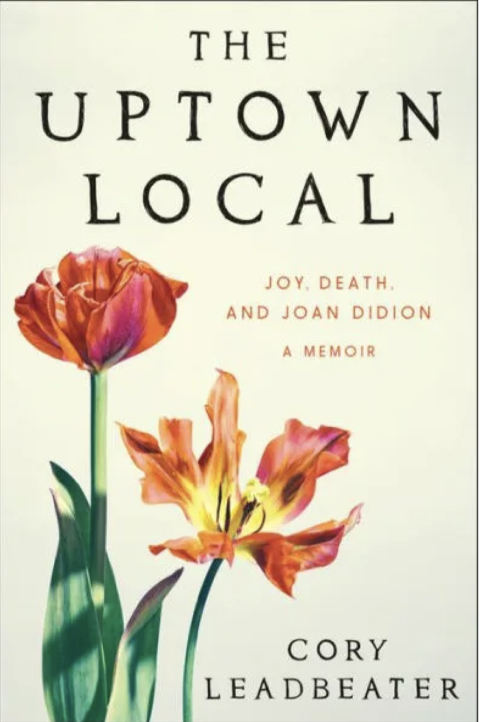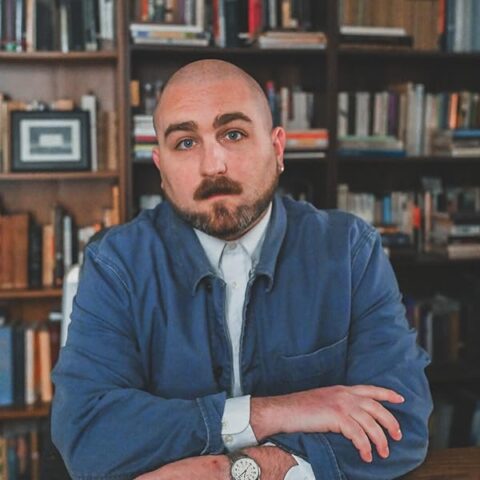Cory Leadbeater worked as Joan Didion’s assistant during the last nine years of her life, four of them living in her New York home. As he describes the experience in his memoir, The Uptown Local, the experience was understandably life-changing — a New Jersey boy with no literary peerage had managed to hitch a rocket ride to the center of America’s literary elite. But being in the same place as a group isn’t the same thing as belonging in it. The book is reserved when it comes to details about Didion’s life, and he shares even less about her as a writer — Leadbeater assumes we know much of that. But the book has a lot to say about class, keeping up appearances, and how grinding those divisions can be.
 Leadbeater sets up the key distinction early: While he was a Columbia grad student laboring over poems and fiction, eventually building the contacts that led him to Didion’s doorstep, he was also paying regular visits to the federal prison in Pennsylvania where his father was incarcerated for real estate fraud. He keeps each side of his life separate from the other — his lower-middle class dad wouldn’t care about the Didion demimonde, and he feared Didion would only exile him if she knew. Which is somewhat odd — after all, Didion the reporter was attracted to crime stories and well aware of broken systems. But part of being lower-middle class is knowing you can easily be shoved a few rungs further down. “Jail life did not go with Joan life, and in struggling to keep them separate, I was beginning to fray,” he writes.
Leadbeater sets up the key distinction early: While he was a Columbia grad student laboring over poems and fiction, eventually building the contacts that led him to Didion’s doorstep, he was also paying regular visits to the federal prison in Pennsylvania where his father was incarcerated for real estate fraud. He keeps each side of his life separate from the other — his lower-middle class dad wouldn’t care about the Didion demimonde, and he feared Didion would only exile him if she knew. Which is somewhat odd — after all, Didion the reporter was attracted to crime stories and well aware of broken systems. But part of being lower-middle class is knowing you can easily be shoved a few rungs further down. “Jail life did not go with Joan life, and in struggling to keep them separate, I was beginning to fray,” he writes.
His fraying is of a 20-something sort — he struggles to produce an epic poem that would “synthesize the violent events of our time — the Oklahoma City Bombing, Columbine, 9/11 — into an idea about what was rotten at the core of the American psyche.” He then shifts gears to a novel about Oklahoma horse country, whose hero, Billy Silvers, he talks about as if he were a real person. (Not a bad conceit — works in progress are intrusive forces in one’s life, messing with your mood and schedule like a semi-welcome houseguest.) When a friend and fellow writer commits suicide, he bounces across relationships and drinks heavily — all of this more or less insulated from Didion.
“Joan’s world had offered me an emergency exit, a trapdoor into a wildly free, safe new life where my previous circumstances could not follow,” he writes. Safe, sure. But free? That part is debatable: Didion is often framed as a substitute mother, a role he suggests she willingly took on. She inscribed a first edition of her novel Play It as It Lays to him as “mommy’s snake book.” When a friend asks Didion directly if Leadbeater is like a son, she says yes. “I went into my office and cried,” he writes. Desperate to stay in her good graces, the memoir’s most triumphant moments come when she demonstrates he’s pulled it off.
Which is to say that The Uptown Local keeps Didion at arm’s length as a person, because despite their obvious intimacy he’s put her on a pedestal, ensuring that what details he shares don’t chip the marble. Despite her frailty, he writes, she had a voracious appetite; despite her famed glower she laughed uproariously; despite her persona of icy certainty her mind could be changed. (He notes that she came around about Virginia Woolf, whose Mrs. Dalloway he read to her during a hospital stay). This distancing is understandable. But the tricky part for Leadbeater as a memoirist is that he also keeps himself somewhat at arm’s length. He avoids dwelling too long on any one subject — the failed novel represented by a high-powered but unnamed agent (almost certainly Andrew Wylie), his friend’s death, his drinking, his self-destructiveness, his obsession with chess, the server at Dunkin’ Donuts who sells him on the work Naguib Mahfouz. If there’s a lesson to be taken from these experiences, he doesn’t pursue it, or pursues it only in half-hearted ways — at one point he turns to a chatbot for advice. Cool as Didion, but desperate for motherly attention.
 Leadbeater’s explanation for this flitting about is that, like his spiritual mentor, we all contain multitudes: “Joan’s truth, her real gift, was that she did not strain to separate things; she found others who strained to separate things or categorize things to be insufferable; this was her most lasting gift to me. She gave me permission to be myself in toto, to continue to catalogue all the aspects of my self that seemed to operate without harmony or precision all at once, because accurate accounting mattered more than neat narrative.” More directly, it’s simply that bright twentysomethings are often a mess, and The Uptown Local captures the messes. What the book misses in neat narrative it does achieve in a fairly tidy tone. Books about literary apprenticeship tend to be elegaic, suffused with a sense that coming of age means coming to terms with the frustration of not having grown up enough. Leadbeater’s book is akin to Darryl Pinckney’s Come Back in September, his memoir of his intellectual tutelage under Elizabeth Hardwick. Leadbeater is an inheritor not just of the tone but the milieu — it was Pinckney’s partner, the poet James Fenton, who connected Leadbeater with Didion. And the core approach is the same: A young writer relays their path to maturity, while projecting the naivete that brought them to their apprenticeship in the first place.
Leadbeater’s explanation for this flitting about is that, like his spiritual mentor, we all contain multitudes: “Joan’s truth, her real gift, was that she did not strain to separate things; she found others who strained to separate things or categorize things to be insufferable; this was her most lasting gift to me. She gave me permission to be myself in toto, to continue to catalogue all the aspects of my self that seemed to operate without harmony or precision all at once, because accurate accounting mattered more than neat narrative.” More directly, it’s simply that bright twentysomethings are often a mess, and The Uptown Local captures the messes. What the book misses in neat narrative it does achieve in a fairly tidy tone. Books about literary apprenticeship tend to be elegaic, suffused with a sense that coming of age means coming to terms with the frustration of not having grown up enough. Leadbeater’s book is akin to Darryl Pinckney’s Come Back in September, his memoir of his intellectual tutelage under Elizabeth Hardwick. Leadbeater is an inheritor not just of the tone but the milieu — it was Pinckney’s partner, the poet James Fenton, who connected Leadbeater with Didion. And the core approach is the same: A young writer relays their path to maturity, while projecting the naivete that brought them to their apprenticeship in the first place.
There’s a certain courage to Leadbeater’s approach — he is decidedly unresolved by the book’s end, though he’s married with kids and taking on adult responsibilities. He acknowledges that he hasn’t entirely broken free of the apron strings — he keeps the various alerts on his phone that signaled Didion’s meal times, for instance. (“‘I love you, Joan,’ I say to no one,” he says after one chirps.) The sensibility makes the prose precious at times: “Before Joan’s, I had not ever registered, really, a tulip.” Yet he’s not asking you to think his experience with Joan was precious itself; as he cycles through fear, drinking, a failure to see himself clearly, to keep his father put away emotionally, he contracts and expands — here suicidal, here basking in the refracted glow of his mentor. He’s constantly alert to “the widening gap between the world I’d come from and the world I was moving further and further into.” The world, though, isn’t Didion’s — it’s his own, it’s just that he hasn’t arrived there yet.
[Published by Ecco on June 11, 2024; 224 pages, $28 hardback.]